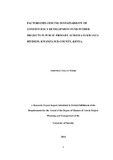| dc.description.abstract | Development in a country takes place if its young learners perform well
in education at different levels. In Kenya performance at primary level is
ascertained after pupils sit for the Kenya Certificate of Primary Education
(KCPE) Examinations at standard eight thus necessitated the need for the
availability of Constituency Development Fund in Kwanza Sub-County to spur
development in schools. The purpose of this study was to investigate the
factors influencing sustainability of Constituency Development fund funded
projects in public primary schools in Kwanza Division, Kwanza sub-county. A
project is considered to be sustainable if it continues to deliver a high level of
benefits after the donor ends major financial, managerial and technical support.
The Constituency Development Fund (CDF) act provides that only projects
that benefit the community at large should benefit from CDF funding though a
significant number of CDF initiated projects since 2012/13 have been
successfully completed and are in use, many more have stalled or still ongoing
several months after being initiated. Others are underutilized or not utilized at
all. The objectives of the study were: - to establish how BOM influence
sustainability of CDF funded projects identification and costing, the extent at
which political interest influence the sustainability of constituency
development projects, to examine how local community involvement also
influence the sustainability of constituency development projects. Also to
examine how availability of funds influences the same constituency
development funds funded projects in public primary schools. The study
findings may be used by the ministry of education to formulate financial
policies related to CDF funds management and sustainability. The study is
based on the theory of needs achievement as asserted by David Mcelland. The
study adopted descriptive survey design. The respondents were 35 BOM
chairpersons, 35 Head teachers, 1 DEO, 3 PDOs and 13 CDF committee
members. The researcher used questionnaires, interview guide and observation
checklist to collect data. Validity of the instrument was established through
sharing the information in the questionnaires with the lecturers and colleague
students to establish whether the questions were relevant. Reliability of the
instrument was tested through test-retest method. Quantitative data was
analyzed through descriptive statistics using SPSS programme and presented
using percentages, tables and frequencies. Qualitative data was analyzed
through content analysis which in turn was analyzed by organizing data into
themes. | en_US |

